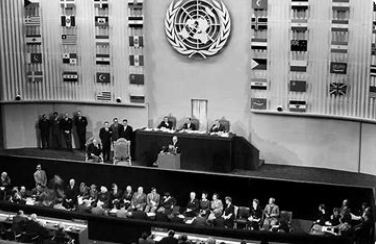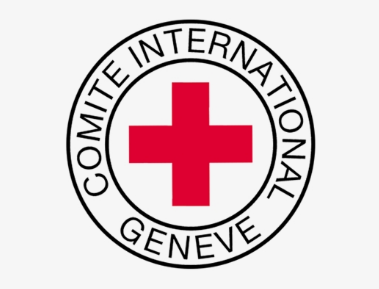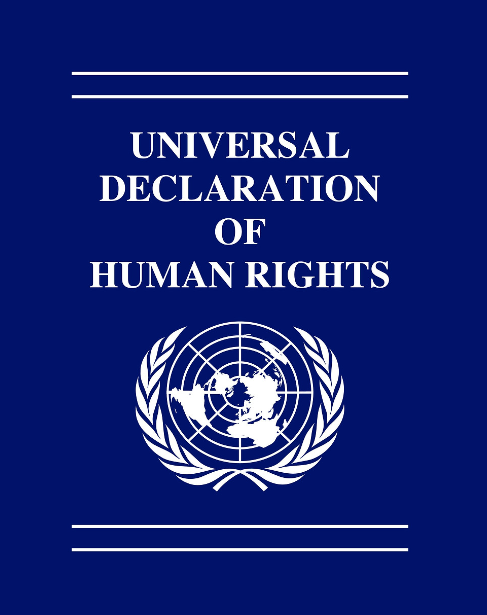Governance & Security
The Universal Declaration of Human Rights (UDHR)
Introduction
The United Nations General Assembly adopted the Universal Declaration of Human Rights (UDHR) on December 10, 1948. It is a significant document in the development of human rights, outlining essential human rights that should be universally safeguarded.
The Universal Declaration of Human Rights (UDHR) establishes the context for the subsequent articles by emphasising the fundamental importance of the intrinsic worth and equal rights that are inalienable of every individual in the human community. These principles serve as the basis for the promotion of justice, peace, and liberty worldwide. This statement recognises the cruel and savage actions that deeply offended the moral principles of mankind during World War II also emphasises the significance of safeguarding human rights by upholding the principles of legal governance.
Overview of Articles

Article 1:
Affirms that every individual is inherently free and possesses equal worth and entitlements from birth. Individuals have the capacity for rational thinking and moral judgement and should interact with each other in a spirit of unity and fraternity.
Article 2:
the declaration stipulates that all individuals are entitled to the full range of rights and freedoms outlined therein, without any form of discrimination based on factors such as race, colour, sex, language, religion, political or other opinion, national or social origin, property, birth, or any other status.
Article 3:
The declaration affirms the fundamental entitlement to life, freedom, and protection of individuals.
Article 4:
The document explicitly forbids the practice of slavery and servitude in any and all manifestations.
Article 5:
The document prohibits the act of torture and any form of treatment or punishment that is cruel, inhuman, or degrading.
Article 6:
Acknowledges the universal right of every individual to be recognised as a legal person in all places.
Article 7:
Explicitly declares the principle of legal equality and the right to equal protection under the law, without any form of discrimination.
Article 8:
Guarantees individuals the right to seek redress from competent national courts for any violations of their fundamental rights as established by the constitution or law.
Article 9:
The document prohibits the act of making arrests, detaining individuals, or forcing them into exile without any valid reason or justification.
Article 10:
Guarantees individuals the right to a just and open trial conducted by a neutral and unbiased court when determining their rights and responsibilities, as well as in any criminal proceedings.
Article 11:
Guarantees the presumption of innocence until proven guilty and safeguards the right to a trial that is open to the public.
Article 12:
The Universal Declaration of Human Rights safeguards individuals from unwarranted intrusion into their personal lives, including privacy, family, home, and communication, as well as from any harm to their reputation or honour.
Article 13:
Ensures the entitlement to unrestricted movement and habitation within the territorial boundaries of each nation, as well as the freedom to depart from any country, including one’s own, and to return to one’s homeland.
Article 14:
The Universal Declaration of Human Rights guarantees individuals the right to request protection from persecution by seeking asylum in foreign countries.
Article 15:
Acknowledges the entitlement to citizenship and the freedom to alter one’s citizenship.
Article 16:
Guarantees individuals the right to marry and establish a family. It also ensures that all individuals have equal rights in relation to marriage, both during the marriage and in the event of its dissolution.
Article 17:
Guarantees individuals the right to marry and establish a family. It also ensures that all individuals have equal rights in relation to marriage, both during the marriage and in the event of its dissolution.
Article 18:
The document ensures the protection of individuals’ rights to freely hold and express their thoughts, beliefs, and religious practices.
Article 19:
Guarantees individuals the right to freely express their opinions and thoughts.
Article 20:
Safeguards the entitlement to engage in peaceful gatherings and form associations.
Article 21:
Guarantees individuals the right to participate in the governance of their country, either directly or by selecting representatives of their choice. It also ensures that everyone has equal opportunities to access public service.
Article 22:
Acknowledges the entitlement to social security and the essential economic, social, and cultural rights necessary for maintaining dignity and enabling the unrestricted growth of an individual’s character.
Article 23:
Guarantees the entitlement to employment, the freedom to choose one’s occupation, fair and favourable working conditions, and safeguards against unemployment.
Article 24:
The legislation guarantees individuals the right to rest and leisure, which includes the fair restriction of working hours and regular paid holidays.
Article 25:
Acknowledges the entitlement to a satisfactory level of living, encompassing provisions such as nourishment, attire, shelter, medical assistance, and essential social services. It also recognises the right to protection in case of unemployment, illness, disability, widowhood, advanced age, or other forms of destitution.
Article 25:
Guarantees the entitlement to education, which must be provided without charge, particularly in the primary and fundamental levels. Furthermore, education should aim to foster the complete growth of the individual’s character.
Article 26:
Guarantees the entitlement to education, which must be provided without charge, particularly in the primary and fundamental levels. Furthermore, education should aim to foster the complete growth of the individual’s character.
Article 27:
Asserts the entitlement to unrestricted engagement in the cultural activities of the community, the enjoyment of artistic endeavours, and the participation in scientific progress and its advantages.
Article 28:
Stipulates that every individual has the right to a social and international system that allows for the complete realisation of the rights and freedoms outlined in the declaration.
Article 29:
States that individuals have obligations to the community and that while exercising their rights and freedoms, they must adhere to legal limitations that are solely aimed at ensuring the proper acknowledgment and respect for the rights and freedoms of others.
Article 30:
States that the declaration does not imply any right for any state, group, or individual to engage in activities that aim to destroy any of the rights and freedoms mentioned in the declaration.
Significance and Importance of the UDHR
The UDHR has served as the foundation for an expanding system of international human rights protection that includes legally binding treaties, such as the International Covenant on Civil and Political Rights (ICCPR) and the International Covenant on Economic, Social and Cultural Rights (ICESCR). It has influenced numerous national constitutions and laws and has been invoked by human rights activists worldwide.
References
The United Nations was established in 1948. The Universal Declaration of Human Rights. Obtained from the official website of the United Nations
Morsink, J. (1999). The topic of discussion is the origins, drafting process, and intended purpose of the Universal Declaration of Human Rights. The publisher is the University of Pennsylvania Press.
Glendon, M. A. (2001). A World Made New: Eleanor Roosevelt and the Universal Declaration of Human Rights. Random House.
The Universal Declaration of Human Rights (UDHR) continues to be a crucial instrument for safeguarding and advancing human rights on a global scale, encapsulating the universal desires for liberty, fairness, and parity.
Report on the Governance of the United Nations

The administration and management of the United Nations
The governance framework of the United Nations (UN) is strategically designed to facilitate global collaboration and uphold peace and security worldwide. The United Nations, founded in 1945, is composed of various essential organs and specialised agencies, each assigned with unique roles and responsibilities. This report provides a comprehensive overview of the main elements of the United Nations’ governance structure, specifically examining the roles and connections between its key organs and agencies.
1. The principal organs of the United Nations are:
The United Nations’ governance framework consists of six primary organs, each fulfilling a distinct role in the organization’s mission:
1.1 The General Assembly
The General Assembly (GA) is the primary forum for deliberation, where all 193 member states are represented. It serves as a platform for collective deliberation on global matters encompassed by the UN Charter.
Duties: The General Assembly supervises the financial plan of the United Nations, selects temporary members for the Security Council, and provides suggestions by means of resolutions. While the resolutions lack legal enforceability, they possess substantial moral and political influence.
1.2 Security Council Purpose:
The Security Council (SC) is tasked with the responsibility of upholding global peace and security.
The composition of the group is comprised of 15 members, with five permanent members (China, France, Russia, the United Kingdom, and the United States) who have the authority to veto decisions, and 10 non-permanent members who are elected for two-year terms.
Duties: The Security Council has the power to enforce penalties, grant permission for the use of military action to uphold or restore global peace and security, and create peacekeeping missions.
The International Court of Justice is a legal institution.
The International Court of Justice (ICJ) serves the purpose of resolving legal conflicts between nations and providing expert guidance on matters of international law.
The composition of the body is comprised of 15 judges who are elected to serve nine-year terms by both the General Assembly and the Security Council.
Responsibilities: The rulings of the ICJ are obligatory, despite its limited ability to directly enforce them.
1.4 Secretariat Purpose: The Secretariat performs the daily tasks of the United Nations as directed by the other main organs.
The composition of the organisation consists of a Secretary-General who is appointed by the General Assembly based on the recommendation of the Security Council. The Secretary-General serves for a term of five years, which can be renewed.
The Secretariat is responsible for overseeing peacekeeping operations, facilitating negotiations in international conflicts, analysing economic and social patterns, and coordinating international conferences.
1.5 The Economic and Social Council (ECOSOC) serves as the primary entity responsible for coordinating, reviewing, engaging in dialogue, and providing recommendations on matters about the economy, society, and the environment.
The composition of the organisation is comprised of 54 member governments that are elected by the General Assembly for overlapping three-year terms.
ECOSOC is responsible for supervising the activities of different specialised agencies, functional commissions, and regional commissions.
1.6 The Trusteeship Council was created to supervise the management of trust territories and ensure that their residents were adequately prepared for self-governance.
Status: The Trusteeship Council has ceased operations since 1994, after the independence of Palau, the final trust territory.
2. Related Organisations and Specialised Agencies
The UN system is made up of a number of specialised agencies and affiliated groups, all of which operate independently while collaborating with the UN through ECOSOC and are concentrated on particular issues:
Within the framework of the UN, the World Health Organisation (WHO) oversees and plans the global health sector.
The International Monetary Fund (IMF) seeks to promote development and stabilise global monetary exchange rates.
World Bank Group: Offers developing nations financial and technical support for their development initiatives.
Education, science, culture, and communication are all promoted by the United Nations Educational, Scientific, and Cultural Organisation (UNESCO).
The International Labour Organisation (ILO) is a body that deals with matters pertaining to labour, especially decent work for everyone and international labour standards.
The Food and Agriculture Organisation (FAO) is in charge of organising global initiatives to end hunger and enhance food security and nutrition.
3. Important Issues in Governance
The UN faces a number of governance obstacles, such as:
Decision-Making Processes: The Security Council needs to be reformed, especially in regards to the permanent members’ veto power, which can obstruct prompt action.
Resource Allocation: Ensuring that resources are distributed across its numerous projects and programmes in an effective and fair manner.
Accountability and openness: To uphold credibility and trust, it is important to improve accountability and openness in its management and operations.
Conclusion
The United Nations is governed by a complex web of organisations and departments working together to address global issues. Even if the framework facilitates extensive international cooperation, continuous adjustments and modifications are required to fairly and successfully address today’s challenges. The UN’s continued relevance and effectiveness in advancing global development, security, and peace depend heavily on its capacity to adapt and change in response to changing circumstances.


